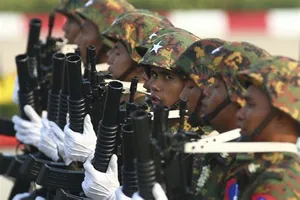
In the early days of a brutal 2021 military crackdown on anti-coup protesters in Myanmar, members of the nascent resistance movement began asking “how many dead bodies” it would take for the world community to act. More than two years on from a coup that installed military rule in the Southeast Asian country, pro-democracy protesters say they have yet to receive an adequate answer.
On April 11, 2023, the country’s armed forces dropped multiple bombs on a gathering in Pazigyi, a village in Sagaing Region, killing around 100 people, it has been estimated, including many children. Such attacks are not uncommon, if not usually so deadly. The day before the Sagaing massacre, the Myanmar air force dropped bombs in Falam, Chin State, killing 11 people.
In fact, since civil war broke out, 3,240 civilians and pro-democracy activists have been killed, according to the human rights group Assistance Association for Political Prisoners. In response, a fierce resistance movement has emerged, with an estimated 65,000 fighters using ambushes and other guerrilla tactics against military targets.
As a scholar on Myanmar’s history, I would argue that the escalating violence can be attributed to two main factors, one internal and one external: a miscalculation by the military over the resistance of Myanmar’s people, and ambivalence from the international community.
From coup to civil war
Myanmar has witnessed killings by the military almost daily since generals seized control of the country in 2021.The coup ended the short period of democratic rule under Nobel Laureate Aung San Suu Kyi’s party, the National League for Democracy. But there are, I believe, reasons to suggest that the Myanmar military grossly miscalculated the timing of the coup, and underestimated the sentiment of a people unwilling to give up the freedom and prosperity they experienced under democracy. In this, the military may have been misled by the experience of their counterparts in neighbouring Thailand.
The Myanmar military similarly promised “free and fair elections” further down the line after its coup.Unlike in Thailand, people in Myanmar – especially younger generations that came of age in the democratic decade after 2010 – fiercely resisted the army’s takeover and were skeptical of claims that it would restore democracy. Protracted counter-coup activities have humiliated the Myanmar army. The commander in chief, Min Aung Hlaing, recently conceded that two years after the coup, the military was still not in control of swaths of the country. He vowed to intensify a crackdown against people he branded “terrorists.” The growing instability, Min Aung Hlaing said, meant that promised elections – after which the military was to hand over power to a civilian government – cannot be scheduled.
-Tharaphi Than is Associate Professor of World Cultures and Languages, Northern Illinois University.